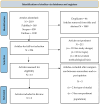Papillomavirus Vaccination Programs and Knowledge Gaps as Barriers to Implementation: A Systematic Review
- PMID: 40432072
- PMCID: PMC12116001
- DOI: 10.3390/vaccines13050460
Papillomavirus Vaccination Programs and Knowledge Gaps as Barriers to Implementation: A Systematic Review
Abstract
Background/objectives: Human papillomavirus (HPV) is a leading cause of cervical cancer. Despite the proven effectiveness of vaccination programs, global coverage remains uneven, with significant disparities across regions due to various socioeconomic, cultural, and political factors. This study explores the primary barriers to HPV vaccination worldwide and proposes recommendations to improve access to screening and vaccination programs.
Methods: A systematic literature review was conducted, analyzing studies published in the past ten years from databases such as PubMed, Scopus, and Embase, following the PRISMA methodology. Study selection involved multiple researchers, with discrepancies resolved through consultation. The quality of the included studies was assessed using CASP checklists. The protocol was registered on Open Science Framework (OSF).
Results: Out of 2119 records, eight studies were included. The findings indicate that the main barriers to HPV vaccination include insufficient public awareness, cultural and religious resistance, financial constraints, and limited access in rural and underserved areas. Additionally, political factors, such as low prioritization of HPV vaccination and the absence of supportive policies, were identified as significant obstacles. Multidisciplinary and cross-cultural collaboration, along with the integration of HPV vaccination into existing health programs, was suggested as a strategic approach to improve vaccine uptake.
Conclusions: Barriers to HPV vaccination, including limited awareness, inadequate healthcare infrastructure, and socioeconomic factors, vary across regions but must be addressed to improve global coverage. Targeted interventions such as health education, inclusive policies, and culturally sensitive campaigns can significantly boost vaccine uptake. Strengthening local health systems and fostering international collaboration are key strategies to overcoming these barriers and ensuring equitable access to HPV vaccination.
Keywords: barriers; health prevention; human papillomavirus vaccination program; public health; systematic review.
Conflict of interest statement
The authors declare no conflicts of interest.
Figures
References
-
- World Health Organization Human Papillomavirus and Cancer. [(accessed on 7 April 2025)]. Available online: https://www.who.int/news-room/fact-sheets/detail/human-papilloma-virus-a....
Publication types
LinkOut - more resources
Full Text Sources
Miscellaneous



